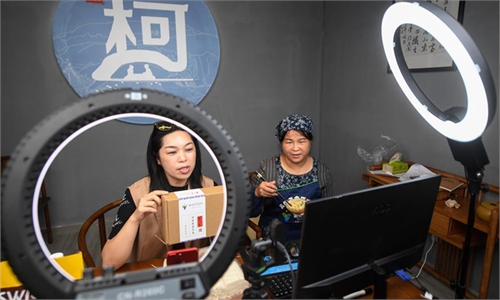
File Photo: VCG
After getting bored with her dull, low-paying job, 25-year-old Long Yuan left her shoe factory to move to Beixiazhu in May, a village in East China's Zhejiang Province that is hundreds of kilometers from her hometown. The village is known as the land of dreams of young people like Long, who have heeded the saying: In Beixiazhu village, you can get rich with a mobile phone.
Comprising of just 22 hectares and 13,000 permanent residents, the village, located within Yiwu City -- the world's largest small commodity wholesale market -- Beixiazhu is home to 1,000 e-commerce companies, 40 branches of express delivery companies and 5,000 internet influencers who make money by promoting products via livestreaming and short video platforms.
As soon as she arrived in Beixiazhu, Long registered an account on Douyin (Chinese domestic version of TikTok). Each day she walks around companies and factories in the village to look for salable products. She peddles the products with exaggerated facial expressions and humor using her cellphone camera, then wait for her viewers nationwide to send orders. Each sale usually nets Long a commission of between 5 and 10 yuan ($0.74-1.49) .
In late September, a Global Times reporter encountered Long promoting a water-resistant power bar on the roadside. She throws the strip into a basin of water and excitedly and loudly shouts enthusiastic words into a mobile phone in front of her. Ten other young women, all newbie "internet celebrities," wait for their turn to hawk the same product to their online subscribers.
"Anyone who wants to peddle it can have a try," Long told the Global Times, saying that within an hour there were some 30 people promoting the power bar on their Douyin account. "Here in Beixiazhu, opportunities come to all," she said.
Livestream shopping craze
Long recalls she once received some 10,000 orders for a paper towel product she promoted online, earning her nearly 100,000 yuan in commission within three days - far more than she earned in a year in her factory job.
"I was completely stunned; I had never sold so many products," Long said. She rightfully claims those paper towel sales were a miracle considering she has fewer than 20,000 Douyin followers.
"Some top internet influencers get more than 100,000 orders from a single livestreaming show," she added.
The huge number of orders embodies the current livestream shopping craze in China, and reflects the country's mushrooming e-commerce industry. More than a million express parcels leave Beixiazhu every day, according to the village's Party chief Huang Zhengxing.
The craze grew even bigger amid the COVID-19 pandemic this year, as an increasing number of Chinese customers shifted to livestream shopping when many offline stores were temporarily closed because of the virus. The number of daily express parcels leaving Beixiazhu doubled in April and May, Huang told the Global Times. He said the village's annual business volume could reach 30 to 40 billion yuan this year.
Products are usually sold at much lower prices via livestreaming promotions, said Zhao Xiaoyan, owner of an e-commerce company in Beixiazhu. "Particularly in these months, when many businesses are eager to recoup their losses caused by the pandemic by selling more products," she explained.
In Zhao's store, various products from food to daily necessities were piled on shelves. Each day Zhao and her team promote a few of them through livestreaming, selling the products at incredibly low prices. Zhao's livestream show, sells a brand name schoolbag, for only 58 yuan, a quarter of the price on China's largest shopping website Taobao.
Zhao said all her products are authentic. "I earn only two or three yuan from each order," she said, adding that strategy of online sellers in Beixiazhu is "small profits, quick turnover" . Zhao said her company receives some 20,000 orders a day, earning her nearly 6 million yuan in net profit each year.
Zhao is one of the most successful entrepreneurs in Beixiazhu. Since arriving here in 2018, she has expanded her team from three to more than 150 and has become a model of getting rich after just two years of hard work.
She owes part of her success to the good business environment. "It's open, orderly, and has a healthy competition," she said, praising the local government for supporting instead of restricting business.
Under the good environment, more people, especially young ones, are coming to Beixiazhu with their mobile phones, expecting to get a share of the livestreaming, e-commerce pie.
Potential crisis
Since Beixiazhu's internet celebrity and e-commerce promotions began in 2017, the village has spawned numerous grass-root online influencers like Zhao and Long.
Huang warns that getting rich is a pipedream for most newcomers as only 30 percent of them actually make money. "Twenty percent break even and 50 percent lose money. Making money is never an easy thing."
The livestream shopping craze is bringing Beixiazhu potential crisis apart from prosperity, as several company owners and "internet celebrities" there reached by the Global Times complained that too many people have crowded into the village this year, having caused a dramatic increase of local rent.
The rent of the stores in Beixiazhu doubled in May, Zhao said. According to Huang, the village has seen more than 10,000 nonlocals come to engage in e-commerce related work this year, much more than the average number of 200-300 in previous years.
"Sadly, the overwhelming majority of them has left, or will leave, within one to three months," said Zhou Cheng, owner of local multi-channel network (MCN) agency Jiuchen Media, which has some 70 "internet influencer" staffers doing livestream promotion works in the village.
The current craze has created a huge bubble in the e-commerce industry, as the livestream selling market has become overextended, Zhou said. He said the number of views of his company's several livestreaming accounts and short-video platforms, including the popular Kwai, are half of what they were in 2019.
"Many people have blindly jumped in and they lack a basic understanding of the big picture," he told the Global Times, saying the meteoric rise of livestream selling is now slowly in decline.
The once enthusiastic Long said she has hit a rough patch since hitting pay dirt with her 100,000-yuan commission on paper towel sales, and these days she only makes a couple of hundred yuan a day and is barely able to cover her daily expenses.
"Though it's hard, I won't give up," Long said.



